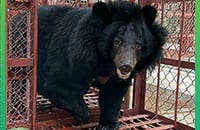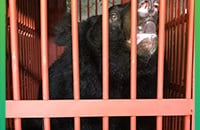Governments collaborate to end illegal dog trade
05 March 2014

Officials from Thailand, Cambodia, Laos and Vietnam have agreed that sustained and directed collaborative actions are needed to fulfil their pledge to eliminate rabies by 2020 and end the inhumane trade in dogs for meat.
The governments made plans for cross-border collaboration in key target areas near the Vietnamese-Laos border and the Thai-Laos border. They will implement pilot programmes for rabies elimination and humane dog population management in these areas, which may be replicated nationwide. Furthermore, officials from Laos pledged to implement a directive to ensure enforcement of border control regulations for dogs, and Cambodia intends to add dogs to its quarantine regulations.
This was the second meeting among government officials and human and animal health experts to discuss sustained and collaborative efforts to tackle rabies and the illegal trade in dogs destined for human consumption, amidst mounting concerns for human health and animal welfare. Thailand’s Department of Livestock Development and the Asia Canine Protection Alliance - made up of Change For Animals Foundation, Humane Society International, Animals Asia and Soi Dog Foundation co-hosted the meeting.
The commercial trade in dogs for human consumption is responsible for the slaughter of an estimated five million dogs per year. Thailand, Cambodia and Laos supply dogs for the trade into Vietnam, where the animals are slaughtered and consumed. The trade is in breach of national animal disease prevention measures and contravenes global recommendations for rabies control and elimination.
Lola Webber, Programmes Leader for Change For Animals Foundation said:
“The dog meat trade is undermining rabies elimination efforts in the region. Many dogs carry deadly diseases, such as rabies, and transport conditions increase the possibility of disease exchange”
Kelly O’Meara, Director of Companion Animals and Engagement for Humane Society International said:
“Dogs of unknown origin and background, many of whom are pets, are stolen from the streets and transported without food or water, over gruelling distances, from one country to another. We applaud the region’s governments for collaborating to put an end to the cruel and inhumane dog trade for human consumption.”
As rabies concerns rise, Vietnam’s Department of Animal Health already has made significant progress in tackling the dog meat trade through the enactment of a new directive ordering provincial authorities to crack down on the illegal trafficking of dogs for human consumption. The directive was made following the recommendation of a five-year moratorium on the commercial transport of dogs from one country to another agreed to at the alliance’s first meeting with government officials in Hanoi last August.
John Dalley, Vice President, Soi Dog Foundation, said:
“The commitment shown by the delegates from all four countries to stop the illegal trade in dogs and eliminate rabies in the region is very encouraging, particularly the decision to work together at targeted border regions where rabies is an issue. Clearly all four countries face many challenges in finally eliminating rabies and humanely controlling the stray dog problem in their countries, but with government and potential outside support there is no reason why this could not be achieved by 2020”.
Tuan Bendixsen, Vietnam Director for Animals Asia said:
“Maintaining and/or regulating the dog meat trade is not a viable option if the ASEAN Rabies Control Goal is to be met. Given the dog meat trade involves the only current mass movement of known or suspected rabies-infected dogs, there is a strong argument to stop the cycle of infection by banning this trade entirely.”
The alliance has agreed to provide financial assistance, expertise and other resources to end the dog meat trade and support efforts to control and eliminate rabies.
Dr Van Dang Ky, Chief of the Epidemiology Division at the Department of Animal Health, Vietnam said:
"Vietnam is committed to eradicating rabies by 2020, we fully supported ACPA's initiatives and conference recommendations. Vietnam will work closely with other countries in the region to stop the illegal transport of dogs into Vietnam for the dog trade."
Dr Tritsadee Chaosuancharoen, Director General of the Thai Department of Livestock Development stated:
“We would be pleased if we could continue our work with all the stakeholders including ACPA, US CDC, OIE, GARC and with the officers from our neighbouring countries to make the region rabies free.”
BACK




 Freedom after two decades: Moon bears Nang and Mua rescued
Freedom after two decades: Moon bears Nang and Mua rescued
 With heavy hearts we say goodbye to our beloved Tulip
With heavy hearts we say goodbye to our beloved Tulip
 Three moon bears rescued from notorious bear bile farming hotspots in Vietnam
Three moon bears rescued from notorious bear bile farming hotspots in Vietnam
